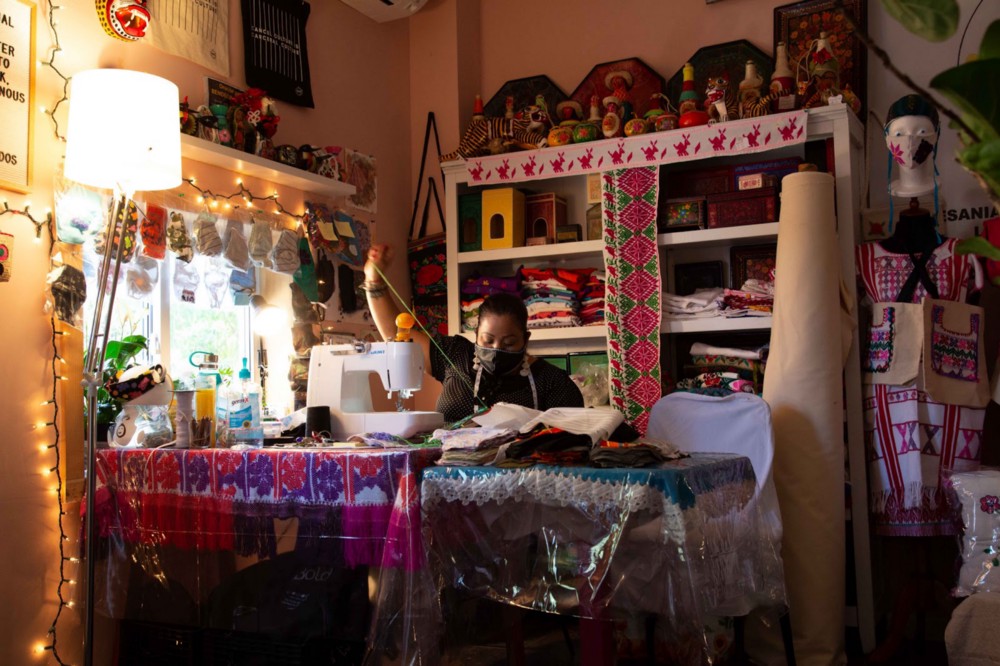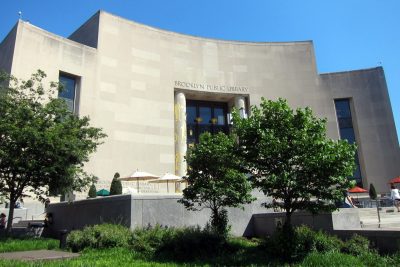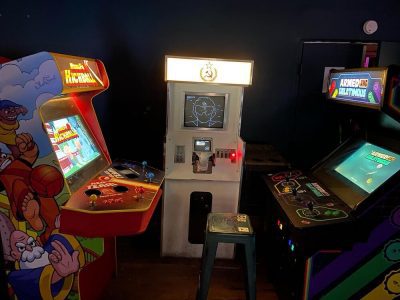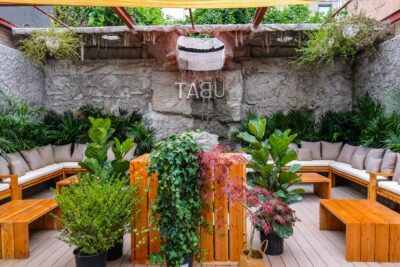A bookstore on a mission to preserve Latinx and Black Bushwick
How Mil Mundos—a bilingual cafe, bookstore and bulwark against gentrification—fights for cultural preservation, even during a pandemic
Maya Castrejon has spent all of her eight years of life growing up next to a small deli on Linden Street in Bushwick, Brooklyn.
But something changed when she turned 6: The deli closed and in its place was a bookstore. Suddenly, in the spring of 2019, the cans of beans and bags of rice that once filled the shelves of the storefront were replaced with colorful book covers that spoke of familiar and foreign histories, Mother Earth, “malcriadas,” and more. The sign above the front entrance read “Mil Mundos,” a thousand worlds.
“I remember Maya walked in and was like ‘oh my god,’” says Maria Herron, founder of Mil Mundos. “She’d never really been in a space like that.”
Mil Mundos is a cafe, community center and Bushwick’s first bilingual bookstore. And today, Maya spends most of her days in the store drawing and perusing. Her mother calls her “the princess of Mil Mundos.”
It began as an idea in 2018 when encroaching gentrification in the neighborhood prompted Herron to create a space that could cater to the locals who had been there for generations, and invite them in to hold conversations about Black, Latinx and indigenous heritage. It’s collectively run by a group of six who reflect that diversity.
“We wanted to curate through a lens that is our own,” Herron says.
More than half—55.3 percent—of Bushwick’s population is Hispanic, and the school district is made up of 56 percent Latinx students. But, Herron says, “Nobody ever considers the Spanish-speaking population when opening a new business here.”
The Montréal model
A few years before opening Mil Mundos, Herron lived in Montréal, Canada, where the official languages are both English and French. She described it as a place where laws around language are altogether unique. In Canada, there is legislation in place that requires advertising and signs to include both languages, and in Québec, the country’s second-most populous province, French has to be clearly “more predominant.” Toys and games can only be sold in Québec if a French version is available and a business must have a French version of its website if it has an address in Québec or sells products or services in the province.
“You have this fight for cultural preservation and fight for dignity that this [French] culture isn’t just something to sweep under the rug,” she says. “But it’s also different because it’s two European cultures head to head, it’s not one Central or South American with one European like it is here.”
Bushwick saw a substantial influx of non-Hispanics between 2000 to 2018—about 20 percent uptick in whites, according to New York University’s Furman Center. Meanwhile, Hispanic and Black residents moved out. Although the rush of new residents has brought some positives to the area, their presence has presented a struggle for long-term, Hispanic residents of Bushwick.
“New developments go up, they’re not for us … most of the new businesses are places where browsing does not occur,” Herron says. “There’s an implicit contract that you’re going to have to spend money and that you don’t belong there if you can’t participate in that capital.”
While bookstores are common in Manhattan and other Brooklyn neighborhoods, in Bushwick they are not.
“One of the biggest issues is the lack of cultural and educational after school centers,” says Samy Nemir Olivares, District Leader in Brooklyn’s Assembly District 53. “Lack of major funding has deprived children here of having access to them.”
Only 29 percent of Bushwick residents older than 25 today have earned a bachelor’s degree or higher, according to the last census. Herron believes that number may even be inflated. Bushwick came out undercounted in the 2010 census due to a lack of education about the census and an undocumented population with an aversion to federal authority, according to Randall Toure, senior project manager at Riseboro, a non-profit organization that works to develop neighborhoods in Brooklyn.
With educational resources and college opportunities few and far between, all signs point towards Bushwick being an education desert.
And Herron believes there are ways in which these education deserts manifest. “We have to talk about the different things that people take for granted when they have access to higher education,” she says. “There’s a lot that goes into the dignity that’s required to invite yourself to higher education, to have the audacity to think you would do well in college.”
So Mil Mundos began to reach out to schools in the district for field trip programming, charging $15 a student—a price that includes a trip and a book. One elementary school Mil Mundos spoke with had only taken one school trip the year before, to a police precinct. A local charter school told Herron last February that they were “trying to get the kids to speak English”—the majority of their students are Spanish speakers. So Herron brought in a bilingual book about the life of Celia Cruz, a Black Cuban singer known for her contributions to Latin music in the U.S., and spoke with the students about AfroLatinidad.
“I think we have to understand what goes into allowing kids to dream for themselves,” Herron says. “Giving them places to explore, creating spaces in a community for all ages [to be together], making accessible fields of knowledge and education that they didn’t know about previously to ask for.”
An oasis in the desert
The books that line the shelves of Mil Mundos vary from sci-fi to poetry, sustainability to history.
“We have to be accountable for the lens through which we curate,” says Herron. “Of course there are bookstores that carry foreign language sections but those sections are put to the side, they’re not for the general space.”
And sometimes, that makes sourcing difficult. The Spanish-language publishing capitals are Buenos Aires and Madrid—and freight from Europe is expensive. Often, if a book doesn’t have a U.S. distributor, Mil Mundos can’t get it.
Since the beginning of the Covid-19 crisis, the bookstore has had to restructure its revenue model, remodeling their website for e-commerce, delivering books by bikes, planning pop-ups and offering Spanish classes online.
During the pandemic, Mil Mundos has become a mutual aid depot for the local community, accepting and distributing essential items to families in need in the Bushwick area. And while the store was closed to browsers, it also made room for a new business, giving space to Sonia Castrejon to sew her intricate embroideries with designs that tell the stories of the Michoacan state in Mexico, where she’s originally from. Maya, “the princess of Mil Mundos,” is Castrejon’s daughter.
“Our designs tell a story,” Castrejon says. “Readings and culture always go hand in hand. That’s why I asked them if I could set up here and sell the garments from here.”
Castrejon lost her job at the beginning of the pandemic. Her daughter Maya was the first in her family to contract the coronavirus; Castrejon herself was next.
“There were moments I cried because we didn’t have food to eat,” she says. “There have been very difficult moments but I feel blessed because when certain doors close, others open.”
Castrejon moved to New York City in the early 2000s. In Mexico, she worked in embroidery, sewing pants. In the U.S., she’s worked in construction, canning, butchery and cleaning offices at night. Twenty years later, she’s returned to embroidery, a passion of hers. Castrejon is part of a collective, Ti Toro Miko, that sends the proceeds from the garments back to the community and to their families in Mexico.
“I feel privileged to be here in the bookstore,” she says. “They’re so special to all of us here. They’ve invited my daughter back again and again, and I’ve noticed a big difference in her since it has opened.”
Maya is about to turn 8 and still visits the bookstore almost every day. “If we closed, she would be mad,” Herron says. “But I think now she knows what she would be missing. Now she knows what to ask for from her community.”

Sonia Castrejon sews one of her colorful embroideries at Mil Mundos (photo by Gabriella Canal)
You might also like 


























